Share
Working at ESO
Are you interested in working in areas of frontline technology and in a stimulating international environment? Do you feel your profile matches our requirements? Learn more about our current vacancies and apply online. Read more..
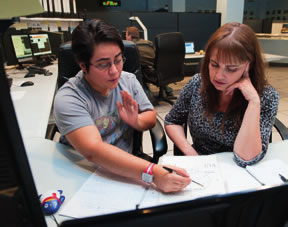
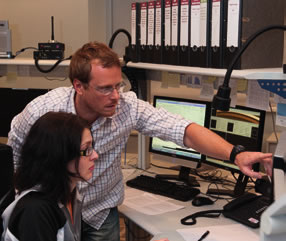

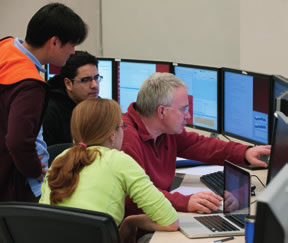
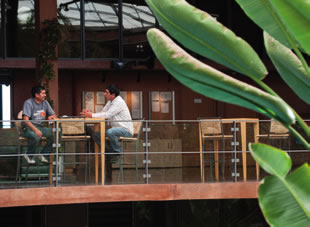
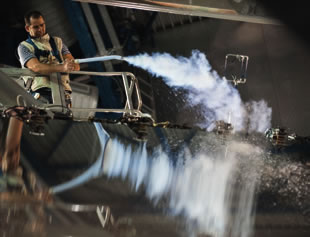
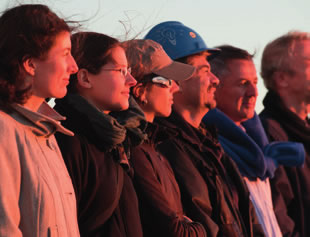
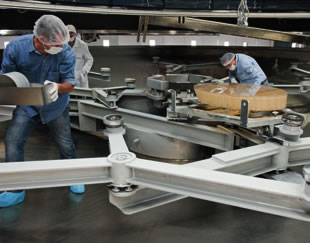
The European Organisation for Astronomical Research in the Southern Hemisphere (ESO) is the foremost intergovernmental astronomy organisation in Europe and the world's most productive ground-based astronomical observatory. ESO carries out an ambitious programme focused on the design, construction and operation of powerful ground-based observing facilities enabling astronomers to make important scientific discoveries.
ESO operates three unique world-class observing sites in northern Chile: La Silla, Paranal and Chajnantor (home to ALMA and APEX), and the ESO Headquarters are located in Garching, near Munich, Germany.
At Paranal, ESO operates the Very Large Telescope, the world's most advanced visible-light astronomical observatory. ESO is a major partner in ALMA, the largest astronomical project in existence. And on Cerro Armazones, ESO is building the 39-metre European Extremely Large Telescope, which will become "the world's biggest eye on the sky" and whose operations will be fully integrated into the Paranal Observatory.
ESO is looking for one
Detectors and Electronics Engineer
Garching
Deadline 08/01/2017
to work in the Electronic Engineering Department, within the Directorate of Engineering at ESO's Headquarters in Garching, near Munich.
About the role:
The department comprises a group of 27 Electronic/Electrical engineers and Technicians who are responsible for the definition, design and implementation of complex control systems for advanced optical and infrared astronomical instrumentation, detectors and telescope systems required for ESO's Observatories in Chile.
Within ESO's matrix structure, you will have responsibility in defining the appropriate sensor technology and detector controller systems to fulfil the scientific requirements of infrared and visible instruments and to design, modify, integrate and qualify infrared and visible detector systems. You will also be responsible for the final performance of the delivered systems and shall be able to provide support to the observatory staff for maintenance and problem solving.
Duties & Responsibilities:
- Define and flow down requirements for Electro-Optical Imaging systems;
- Conduct technical assessments of customer requirements and analyse Electro-Optical imaging system performance;
- Provide technical direction to interdisciplinary teams to support the development of imaging systems;
- Perform as a key participant in design reviews;
- Integrate qualify and test IR/visible imaging systems;
- Collaborate with ESO Engineers from other projects and Observatories, to define common approaches and standards and share experiences;
- Provide support to observatory staff for maintenance and problem solving on IR detectors systems already in operation.
Skills & Experience:
You should have at least three years of significant professional experience in the area of IR/visible detector system design, integration, qualification and test. You should also have significant experience in several of the following fields:
- IR/visible detector system design;
- detector physics;
- optical components of IR/visible cameras and spectrometers and their limiting performances;
- Signal and image processing concepts;
- General familiarity with the design of low noise electronics at cryogenic temperatures; cold optics; mechanical design; cryo/vacuum technology and image processing packages such as IDL.
Competences:
- Derive top-level detector requirements for infrared and visible instruments to achieve photon shot noise limited operation for all observing modes;
- Understand detector physics to be able to initiate new focal plane technology developments needed for future infrared instruments;
- Closely collaborate with instrument consortia and detector manufacturers and establish good working relationships;
- Define and implement complex system requirements for customers and/or prepare studies analysing existing systems;
- Calibrate IR detector systems based on absolute radiometry;
- Establish new calibration standards as required by new technology developments and perform measurements to be able to quantify overall system performance;
- Build strong collaborative working relationships with people from different cultural backgrounds and disciplines;
- Provide clear, concise and timely oral and written communications that identify key issues, examine options and propose a way ahead;
- Acquire new skills, keep up-to-date with the tools used in the daily work, adapt to new procedures and identify ways to optimize the workflow;
- Monitor progress of your own work, deliver to agreed deadlines and standards, plan activities, contribute to system design and been able to work under pressure.
Qualifications:
University degree (MSc) in physics with expertise in solid state physics, electronics and experience in astronomical optics or instruments, or an equivalent educational level.
Language Skills:
A very good command of the English language - oral, reading and writing - is essential and a working knowledge of German or Spanish would be an advantage.
Reports to:
Head of the Detector Group of the Electronic Engineering Department.
Remuneration and Contract:
We offer an attractive remuneration package including a competitive salary (income-tax free), comprehensive pension scheme and medical, educational and other social benefits, as well as financial help in relocating your family and the possibility to place your child/children in day-care.
The initial contract is for a period of three years with the possibility of a fixed-term or indefinite extension based on performance and achievements. The title or grade may be subject to change according to qualification and the number of years of experience.
Starting Date:
As soon as possible
Duty Station:
ESO Headquarters in Garching, near Munich, Germany.
Career Path:
V
Application:
If you are interested in working in areas of frontline technology and in a stimulating international environment, please visit (http://www.eso.org) for further details.
Applicants are invited to apply online at http://jobs.eso.org/. Your application must be completed in English and include a motivation letter and CV. In your CV you should provide us with the names and contact details of three persons familiar with your work and willing to provide a recommendation letter on request.
Closing date for applications is 8 January 2017.
No nationality is in principle excluded however, recruitment preference will be given to nationals of Austria, Belgium, Brazil, the Czech Republic, Denmark, Finland, France, Germany, Italy, the Netherlands, Poland, Portugal, Spain, Sweden, Switzerland and the United Kingdom.
The post is equally open to suitably qualified female and male applicants.
